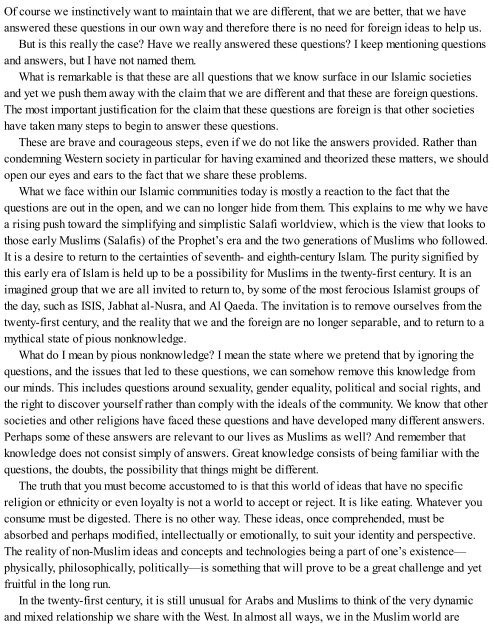1250119847
Create successful ePaper yourself
Turn your PDF publications into a flip-book with our unique Google optimized e-Paper software.
Of course we instinctively want to maintain that we are different, that we are better, that we have<br />
answered these questions in our own way and therefore there is no need for foreign ideas to help us.<br />
But is this really the case? Have we really answered these questions? I keep mentioning questions<br />
and answers, but I have not named them.<br />
What is remarkable is that these are all questions that we know surface in our Islamic societies<br />
and yet we push them away with the claim that we are different and that these are foreign questions.<br />
The most important justification for the claim that these questions are foreign is that other societies<br />
have taken many steps to begin to answer these questions.<br />
These are brave and courageous steps, even if we do not like the answers provided. Rather than<br />
condemning Western society in particular for having examined and theorized these matters, we should<br />
open our eyes and ears to the fact that we share these problems.<br />
What we face within our Islamic communities today is mostly a reaction to the fact that the<br />
questions are out in the open, and we can no longer hide from them. This explains to me why we have<br />
a rising push toward the simplifying and simplistic Salafi worldview, which is the view that looks to<br />
those early Muslims (Salafis) of the Prophet’s era and the two generations of Muslims who followed.<br />
It is a desire to return to the certainties of seventh- and eighth-century Islam. The purity signified by<br />
this early era of Islam is held up to be a possibility for Muslims in the twenty-first century. It is an<br />
imagined group that we are all invited to return to, by some of the most ferocious Islamist groups of<br />
the day, such as ISIS, Jabhat al-Nusra, and Al Qaeda. The invitation is to remove ourselves from the<br />
twenty-first century, and the reality that we and the foreign are no longer separable, and to return to a<br />
mythical state of pious nonknowledge.<br />
What do I mean by pious nonknowledge? I mean the state where we pretend that by ignoring the<br />
questions, and the issues that led to these questions, we can somehow remove this knowledge from<br />
our minds. This includes questions around sexuality, gender equality, political and social rights, and<br />
the right to discover yourself rather than comply with the ideals of the community. We know that other<br />
societies and other religions have faced these questions and have developed many different answers.<br />
Perhaps some of these answers are relevant to our lives as Muslims as well? And remember that<br />
knowledge does not consist simply of answers. Great knowledge consists of being familiar with the<br />
questions, the doubts, the possibility that things might be different.<br />
The truth that you must become accustomed to is that this world of ideas that have no specific<br />
religion or ethnicity or even loyalty is not a world to accept or reject. It is like eating. Whatever you<br />
consume must be digested. There is no other way. These ideas, once comprehended, must be<br />
absorbed and perhaps modified, intellectually or emotionally, to suit your identity and perspective.<br />
The reality of non-Muslim ideas and concepts and technologies being a part of one’s existence—<br />
physically, philosophically, politically—is something that will prove to be a great challenge and yet<br />
fruitful in the long run.<br />
In the twenty-first century, it is still unusual for Arabs and Muslims to think of the very dynamic<br />
and mixed relationship we share with the West. In almost all ways, we in the Muslim world are
















